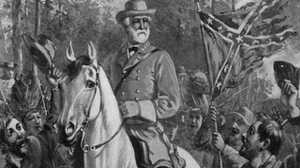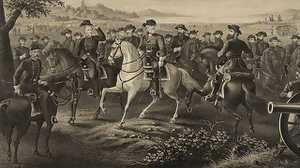Letters from Lee

Letter from Robert E. Lee to Winfield Scott, written two days after his meeting with Francis Blair where he refused command of the Union Army. In this letter Lee explains his reasoning behind his resignation from the U.S. Armed Forces.
Arlington, Washington City, P.O
20 Apr 1861
Lt. Genl Winfield Scott
Commd U.S. Army
Genl, Since my interview with you on the 18th Inst: I have felt that I ought not longer to retain any Commission in the Army. I therefore tender my resignation which I request you will recommend for acceptance. It would have been presented at once but for the struggle it has Cost me to separate myself from a Service to which I have divoted all the best years of my life, & all the ability I possessed. During the whole of that time, more than a quarter of a century, I have experienced nothing but kindness from my superiors & the most Cordial friendships from any Comrades. To no one Genl have I been as much indebted as to yourself for kindness & Consideration & it has always been my ardent desire to merit your approbation. I shall carry with me, to the grave the most grateful recollections of your kind Consideration, & your name & fame will always be dear to me. Save in the defense of my native state shall I ever again draw my sword. Be pleased to accept any more [illegible] wishes for "the Continuance of your happiness & prosperity & believe me.
Most truly yours,
R E Lee
The following is a letter penned by Lee to his youngest daughter Mildred, whom he called "Precious Life," near the end of the war. Many of Lee's letters to his children are published in Robert E. Lee Jr.'s book, Recollections and Letters of General Robert E. Lee.
Camp Petersburg, November 6, 1864
My Precious Life:
This is the first day I have had leisure to answer your letter. I enjoyed it very much at the time of its reception, and have enjoyed it since, but I have often thought of you in the meantime, and have seen you besides. Indeed, I may say, you are never out of my thoughts. I hope you think of me often, and if you could know how earnestly I desire your true happiness, how ardently I pray you may be directed to every good and saved from every evil, you would as sincerely strive for its accomplishment. Now in your youth you must be careful to discipline your thoughts, words, and actions. Habituate yourself to useful employment, regular improvement, and to the benefit of all those around your. You have had some opportunity of learning the rudiments of your education--not as good as I should have desired, but I am much cheered by the belief that you availed yourself of it-- and I think you are now prepared by diligence and study to learn whatever you desire. Do not allow yourself to forget what you have spent so much time and labour acquiring, but increase it every day by extended application. I hope you will embrace in your studies all useful acquisitions. I was much pleased to hear that while at 'Bremo' you passed much of your time in reading and music. All accomplishments will enable you to give pleasure, and thus exert a wholesome influence. Never neglect the means of making yourself useful in the world. I think you will not have to complain of Rob again for neglecting your schoolmates. He has equipped himself with a new uniform from top to toe, and, with a new and handsome horse, is cultivating a marvellous beard and preparing for conquest. I went down on the lines to the right, Friday, beyond Rowanty Creek, and pitched my camp within six miles of Fitzhugh's last night. Rob came up and spent the night with me, and Fitzhugh appeared early in the morning. They rode with me till late that day. I visited the battlefield in that quarter, and General Hampton in describing it said there had not been during the war a more spirited charge than Fitzhugh's division made that day up the Boydton plank road, driving cavalry and infantry before him, in which he was stopped by night. I did not know before that his horse had been shot under him. Give a great deal of love to your dear mother, and kiss your sisters for me. Tell them they must keep well, not talk too much, and go to bed early. Ever your devoted father.
R E Lee
Source: Lee, Robert E., Jr, Recollections and Letters of General Robert E. Lee. New York: Doubleday, Page & Company, 1905.







